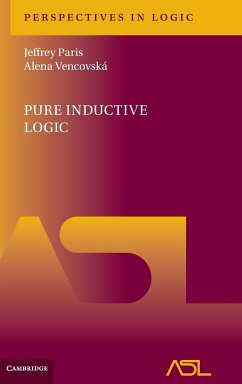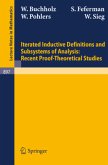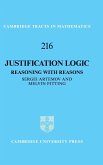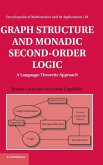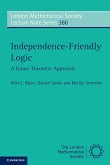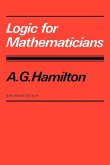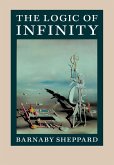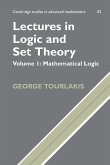- Gebundenes Buch
- Merkliste
- Auf die Merkliste
- Bewerten Bewerten
- Teilen
- Produkt teilen
- Produkterinnerung
- Produkterinnerung
A self-contained guide to pure inductive logic, the study of rational probability treated as a branch of mathematical logic.
Andere Kunden interessierten sich auch für
![Iterated Inductive Definitions and Subsystems of Analysis: Recent Proof-Theoretical Studies Iterated Inductive Definitions and Subsystems of Analysis: Recent Proof-Theoretical Studies]() W. BuchholzIterated Inductive Definitions and Subsystems of Analysis: Recent Proof-Theoretical Studies30,99 €
W. BuchholzIterated Inductive Definitions and Subsystems of Analysis: Recent Proof-Theoretical Studies30,99 €![Justification Logic Justification Logic]() Sergei ArtemovJustification Logic121,99 €
Sergei ArtemovJustification Logic121,99 €![Graph Structure and Monadic Second-Order Logic Graph Structure and Monadic Second-Order Logic]() Bruno CourcelleGraph Structure and Monadic Second-Order Logic192,99 €
Bruno CourcelleGraph Structure and Monadic Second-Order Logic192,99 €![Independence-Friendly Logic Independence-Friendly Logic]() Allen L. MannIndependence-Friendly Logic91,99 €
Allen L. MannIndependence-Friendly Logic91,99 €![Logic for Mathematicians Logic for Mathematicians]() A. G. HamiltonLogic for Mathematicians111,99 €
A. G. HamiltonLogic for Mathematicians111,99 €![The Logic of Infinity The Logic of Infinity]() Barnaby SheppardThe Logic of Infinity38,99 €
Barnaby SheppardThe Logic of Infinity38,99 €![Lectures in Logic and Set Theory Lectures in Logic and Set Theory]() George TourlakisLectures in Logic and Set Theory43,99 €
George TourlakisLectures in Logic and Set Theory43,99 €-
-
-
A self-contained guide to pure inductive logic, the study of rational probability treated as a branch of mathematical logic.
Hinweis: Dieser Artikel kann nur an eine deutsche Lieferadresse ausgeliefert werden.
Hinweis: Dieser Artikel kann nur an eine deutsche Lieferadresse ausgeliefert werden.
Produktdetails
- Produktdetails
- Verlag: Cambridge University Press
- Seitenzahl: 354
- Erscheinungstermin: 4. Februar 2015
- Englisch
- Abmessung: 235mm x 157mm x 24mm
- Gewicht: 664g
- ISBN-13: 9781107042308
- ISBN-10: 1107042305
- Artikelnr.: 40003233
- Herstellerkennzeichnung
- Books on Demand GmbH
- In de Tarpen 42
- 22848 Norderstedt
- info@bod.de
- 040 53433511
- Verlag: Cambridge University Press
- Seitenzahl: 354
- Erscheinungstermin: 4. Februar 2015
- Englisch
- Abmessung: 235mm x 157mm x 24mm
- Gewicht: 664g
- ISBN-13: 9781107042308
- ISBN-10: 1107042305
- Artikelnr.: 40003233
- Herstellerkennzeichnung
- Books on Demand GmbH
- In de Tarpen 42
- 22848 Norderstedt
- info@bod.de
- 040 53433511
Jeff Paris is a Professor in the School of Mathematics at the University of Manchester. His research interests lie in mathematical logic, particularly set theory, models of arithmetic and non-standard logics. In 1983 he was awarded the London Mathematical Society's Junior Whitehead Prize and in 1999 was elected a Fellow of the British Academy in the Philosophy Section. He is the author of The Uncertain Reasoner's Companion (Cambridge University Press, 1995).
Part I. The Basics: 1. Introduction to pure inductive logic
2. Context
3. Probability functions
4. Conditional probability
5. The Dutch book argument
6. Some basic principles
7. Specifying probability functions
Part II. Unary Inductive Logic: 8. Introduction to unary pure inductive logic
9. de Finetti's representation theorem
10. Regularity and universal certainty
11. Relevance
12. Asymptotic conditional probabilities
13. The conditionalization theorem
14. Atom exchangeability
15. Carnap's continuum of inductive methods
16. Irrelevance
17. Another continuum of inductive methods
18. The NP-continuum
19. The weak irrelevance principle
20. Equalities and inequalities
21. Principles of analogy
22. Unary symmetry
Part III. Polyadic Inductive Logic: 23. Introduction to polyadic pure inductive logic
24. Polyadic constant exchangeability
25. Polyadic regularity
26. Spectrum exchangeability
27. Conformity
28. The probability functions $u^{\overline{p},L}$
29. The homogeneous/heterogeneous divide
30. Representation theorems for Sx
31. Language invariance with Sx
32. Sx without language invariance
33. A general representation theorem for Sx
34. The Carnap-Stegmüller principle
35. Instantial relevance and Sx
36. Equality
37. The polyadic Johnson's sufficientness postulate
38. Polyadic symmetry
39. Nathanial's invariance principle, NIP
40. NIP and atom exchangeability
41. The functions $u_{\overline{E}}^{\overline{p},L}$
42. The state of play
Bibliography
Index
Glossary.
2. Context
3. Probability functions
4. Conditional probability
5. The Dutch book argument
6. Some basic principles
7. Specifying probability functions
Part II. Unary Inductive Logic: 8. Introduction to unary pure inductive logic
9. de Finetti's representation theorem
10. Regularity and universal certainty
11. Relevance
12. Asymptotic conditional probabilities
13. The conditionalization theorem
14. Atom exchangeability
15. Carnap's continuum of inductive methods
16. Irrelevance
17. Another continuum of inductive methods
18. The NP-continuum
19. The weak irrelevance principle
20. Equalities and inequalities
21. Principles of analogy
22. Unary symmetry
Part III. Polyadic Inductive Logic: 23. Introduction to polyadic pure inductive logic
24. Polyadic constant exchangeability
25. Polyadic regularity
26. Spectrum exchangeability
27. Conformity
28. The probability functions $u^{\overline{p},L}$
29. The homogeneous/heterogeneous divide
30. Representation theorems for Sx
31. Language invariance with Sx
32. Sx without language invariance
33. A general representation theorem for Sx
34. The Carnap-Stegmüller principle
35. Instantial relevance and Sx
36. Equality
37. The polyadic Johnson's sufficientness postulate
38. Polyadic symmetry
39. Nathanial's invariance principle, NIP
40. NIP and atom exchangeability
41. The functions $u_{\overline{E}}^{\overline{p},L}$
42. The state of play
Bibliography
Index
Glossary.
Part I. The Basics: 1. Introduction to pure inductive logic
2. Context
3. Probability functions
4. Conditional probability
5. The Dutch book argument
6. Some basic principles
7. Specifying probability functions
Part II. Unary Inductive Logic: 8. Introduction to unary pure inductive logic
9. de Finetti's representation theorem
10. Regularity and universal certainty
11. Relevance
12. Asymptotic conditional probabilities
13. The conditionalization theorem
14. Atom exchangeability
15. Carnap's continuum of inductive methods
16. Irrelevance
17. Another continuum of inductive methods
18. The NP-continuum
19. The weak irrelevance principle
20. Equalities and inequalities
21. Principles of analogy
22. Unary symmetry
Part III. Polyadic Inductive Logic: 23. Introduction to polyadic pure inductive logic
24. Polyadic constant exchangeability
25. Polyadic regularity
26. Spectrum exchangeability
27. Conformity
28. The probability functions $u^{\overline{p},L}$
29. The homogeneous/heterogeneous divide
30. Representation theorems for Sx
31. Language invariance with Sx
32. Sx without language invariance
33. A general representation theorem for Sx
34. The Carnap-Stegmüller principle
35. Instantial relevance and Sx
36. Equality
37. The polyadic Johnson's sufficientness postulate
38. Polyadic symmetry
39. Nathanial's invariance principle, NIP
40. NIP and atom exchangeability
41. The functions $u_{\overline{E}}^{\overline{p},L}$
42. The state of play
Bibliography
Index
Glossary.
2. Context
3. Probability functions
4. Conditional probability
5. The Dutch book argument
6. Some basic principles
7. Specifying probability functions
Part II. Unary Inductive Logic: 8. Introduction to unary pure inductive logic
9. de Finetti's representation theorem
10. Regularity and universal certainty
11. Relevance
12. Asymptotic conditional probabilities
13. The conditionalization theorem
14. Atom exchangeability
15. Carnap's continuum of inductive methods
16. Irrelevance
17. Another continuum of inductive methods
18. The NP-continuum
19. The weak irrelevance principle
20. Equalities and inequalities
21. Principles of analogy
22. Unary symmetry
Part III. Polyadic Inductive Logic: 23. Introduction to polyadic pure inductive logic
24. Polyadic constant exchangeability
25. Polyadic regularity
26. Spectrum exchangeability
27. Conformity
28. The probability functions $u^{\overline{p},L}$
29. The homogeneous/heterogeneous divide
30. Representation theorems for Sx
31. Language invariance with Sx
32. Sx without language invariance
33. A general representation theorem for Sx
34. The Carnap-Stegmüller principle
35. Instantial relevance and Sx
36. Equality
37. The polyadic Johnson's sufficientness postulate
38. Polyadic symmetry
39. Nathanial's invariance principle, NIP
40. NIP and atom exchangeability
41. The functions $u_{\overline{E}}^{\overline{p},L}$
42. The state of play
Bibliography
Index
Glossary.

